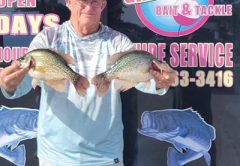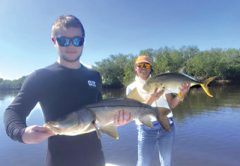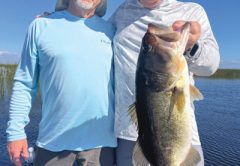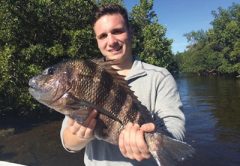What effect does the barometer have on fish, and how does this impact their catchability?
By Sara Menendez
Barotrauma. What is it and how can it impact fish? Barotrauma is caused by the rapid pressure changes fish can experience as they are reeled up from deep water. The pressure changes as they are being reeled in and causes gases in their swim bladder to rapidly expand. The effects can cause serious internal injuries, like a bloated belly, bulging organs (like the stomach), and even bulging eyes and mouth. Unfortunately, barotrauma can also result in fish mortality. Species like bass, walleye, and perch are more susceptible to barotrauma because these species cannot release the excess gas that gets trapped in their swim bladder through their gills as efficiently as other popular freshwater sportfish. Typically, the effects of barotrauma start to become prominent when freshwater fish are brought up from water depths starting around 25-30 feet deep, and anything deeper only poses a more serious concern.
While the overwhelming majority of Florida lakes are bowl shaped, only averaging about 10-12 feet deep, it is still important to understand what barotrauma is and some ways to mitigate it, should you find yourself fishing in deeper Florida lakes, or in reservoirs and lakes elsewhere throughout the country. Mitigation strategies to combat the effects of barotrauma include descending devices like release weights, fish elevators, and mouth clamps. Other anglers prefer to use venting tools that can carefully allow the angler to puncture the swim bladder to release the excess gas. But with every tool, it is important that it is utilized correctly so that it does not cause more damage than help to our fish. Florida Fish and Wildlife Conservation Commission and numerous other state agencies have initiatives to help release fish appropriately to minimize the impacts of barotrauma. I encourage you to check those out today!
Finally, I wanted to inform everyone that this will be my last AskSara column. I am leaving Florida Fish and Wildlife to pursue a new role with the Southwest Florida Water Management District. I have thoroughly enjoyed writing for this magazine, and I have enjoyed getting to know some of you that read these posts. Thank you for being such a passionate group of anglers and I hope to see you on the water some day! Tight lines!






